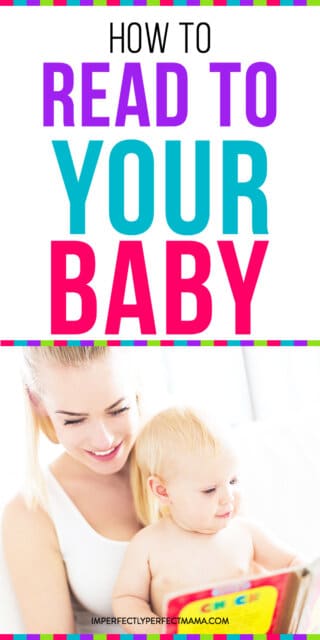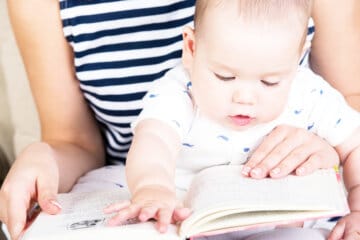As a new mom, you’ve probably heard that reading to your baby is important.

It might seem a little bit silly, reading to such a tiny little person who can’t even focus on the pages yet but the benefits are undeniable.
Reading aloud has a positive impact on your baby’s development in countless ways.
Why is Reading to Your Baby Important?
Keep reading to discover all the reasons reading aloud to your baby is so valuable. You’ll also learn how easy it is to make it a wonderful experience for both of you.
Reading Aloud to Your Baby is a Powerful Opportunity for Bonding
The time you spend reading to your baby can be precious bonding time.
Loving physical contact, combined with a parent’s soothing voice, is a powerful recipe for infant bonding. Time with you is your baby’s favorite thing in the world. Why not make reading aloud part of that time?
Reading Aloud Teaches Babies to Love Books and Reading
When reading aloud is paired with treasured bonding, your baby will grow up viewing reading as a positive activity, right from the start.
It promotes a literacy-rich environment in your home and makes reading for pleasure a natural part of your family’s life.
Reading Aloud Supports Routines in Your Baby’s Day
It gives you a tool for creating routine in your baby’s day.
If you have been struggling to create daily routines for your baby, reading aloud is a great place to start. You can read aloud during feedings, after feedings and just before bedtime.
Get in the habit of handing your baby a board book to look at during diaper changes or while sitting in the high chair waiting for dinner. Building books and reading into your family’s daily routines can actually help create those routines.
Reading Aloud Creates Conversations with Your Baby
Reading aloud gives you a way to communicate naturally with your baby very early on.
Babies will begin to respond to books by waving their arms, kicking their legs or babbling – which is your opportunity to respond with comments about the book and create a “conversation.”
Reading Aloud Supports Oral Language Development
Reading aloud provides exposure to oral language, which lays down the neural pathways for your baby’s oral language skills to develop. Oral language development is a critical reading readiness skill.
During a baby’s first year, receptive language grows exponentially.
It won’t be long at all before you can name a picture in a book and your baby can point to it. A little later on, reading books and inviting your baby’s verbal participation provides many opportunities for your baby to develop expressive language.
Reading Aloud to Babies Develops Reading Readiness
Reading aloud helps your baby develop the pre-reading skills of concepts about print and book handling skills.
Reading aloud helps your baby understand how to hold a book, turn the pages and pay attention to what is on the page.
Tips for Reading Aloud to Your Baby
It can be tricky to know how to read aloud to your baby.
At the beginning they don’t seem to be responding much at all, and you might even feel silly doing it. If this is your first baby, keeping both the baby and the book on your lap may feel like juggling. Trust in the process and keep the following tips in mind.
Choose the Right Books
Be sure to choose the right types of books for reading aloud to your baby.
Choose cloth books or sturdy board books. Look for books with simple, clear images and just a few words on each page.
Have a few board book versions of longer children’s classics like “Brown Bear, Brown Bear,” or “The Very Hungry Caterpillar.” It’s much easier to manage a baby and a small book, rather than a baby and a full-size book.
Add rhyming books to your collection.
Babies are enchanted by rhyming books, and as a bonus, rhyming is a critical reading readiness skill!
Although you do want to expose your growing child to many different books, in babyhood it is better to focus on just a few. When you find board books that appeal to you, read them over and over again to your baby.
This helps your baby become very familiar with them and begin to anticipate the experience of being read to.
Make it Cozy and Comfortable
Of course you’ll want to read to your baby in your lap. However, it is also really convenient to lie down on the floor next to your baby and hold the book above you both. This will necessarily create short, sweet reading sessions, which are best for babies anyway.
Let your baby hold something – a toy, or a bottle. If your baby takes a pacifier, give it to them during reading time. Reading aloud while you nurse can be a wonderful experience.
Keep it Short and Sweet
Try to read for just 3-5 minutes at a time, several times a day. If your baby fusses or starts looking away, take that as your cue to stop for now.
Don’t ever worry about finishing a book. Your goal is to provide consistent, happy exposure to books and reading, not to finish a certain number of books.
Don’t even feel that you have to actually read a book every time, either. Sometimes, look at the pictures and talk about them instead. Point out objects and name them or ask your baby to point to an object.
Make it Fun
Use expression when you read, and give different characters different voices. Let your emotions show – go ahead and laugh if something you read strikes you as funny. Smile and laugh with your baby before, during and after your read aloud sessions.
Make books an integral part of your baby’s environment. Keep board books handy in every room of the house, and in the car. As soon as your baby can reach into a basket of toys and grab the one they want, start including board books in with the toys.
Easy and Powerful
The benefits of reading aloud to your baby just can’t be overstated.
You’ll know it for sure when you have a toddler whose speech and language development is exploding, a preschooler with an enriched vocabulary and, finally, a Kindergartner who learns to read easily and naturally.
Isn’t it wonderful that something so easy and fun has such a powerful impact on your child’s life?




Leave a Reply